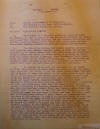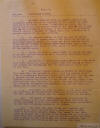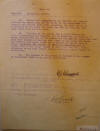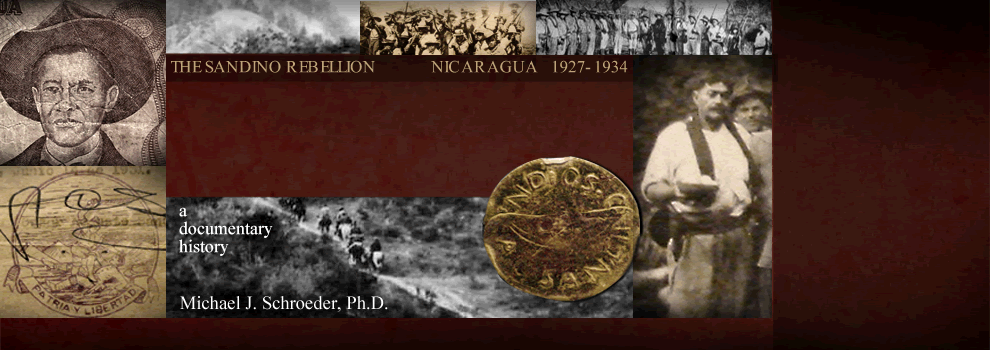|
QUILALI PATROL
2 November, 1927.
|
From:
|
Second Lieutenant C. J.
Chappell.
|
|
To:
|
The Commanding Officer, Fifth
Regiment.
|
|
Via:
|
The Division Commander, Ocotal.
|
|
Subject:
|
Operations Report
|
 1. On October 24, I received orders by plane at
1200 to execute. At 1500 a patrol of one
Second Lieutenant, one doctor and twenty
four enlisted marines and one guardia
lieutenant with fifteen enlisted guardia
left Jicaro with seven days rations. The
patrol reached Jicarito at 2130 and
camped for the night. 1. On October 24, I received orders by plane at
1200 to execute. At 1500 a patrol of one
Second Lieutenant, one doctor and twenty
four enlisted marines and one guardia
lieutenant with fifteen enlisted guardia
left Jicaro with seven days rations. The
patrol reached Jicarito at 2130 and
camped for the night.
2. The following morning the patrol cleared
Jicarito at 0700 arriving near Antonio
Lopez's ranch at 1000. The planes
directed me to remain there until that
afternoon, at Lieut. Gould's patrol was
still two miles south of Quilali. At
about 1630 the planes dropped a message
that Lieut. Gould would reach the scene
of the crash that night. As I had heard
several dynamite bombs exploded ahead of
me, I thought it unwise to travel that
night and made camp on a hill for the
night.
3. On October 26 we left for the scene of the
crash at 0730. After having travelled
about one mile, a bomb was exploded
about 800 yards ahead. I had the point
proceed very cautious and attempted to
cross the saddle on the ridge that we
were following. On arriving at the
bottom point we reached an open area
which lay between us and a very steep
hill covered with thick brush and large
timbers. Sergeant Shumate with the point
discovered bandits on this hill and
opened fire before attempting to cross
this open area. This drew the bandits
fire and they opened up shouting for
Sandino, Sacasa and Chamorro. I moved my
men into position and a short fight took
place. About this time several bombs
were fired in our rear followed by rifle
fire and yelling. To cross the open area
in front and take the hill, could not be
accomplished without a great number of
casualties and the loss of our animals.
To remain in our position where we were
located and allow the enemy to hold the
hill in our rear, would mean the same
result as we had no other cover than
light brush. We forced the enemy to the
rear and took the hill, losing several
animals. To move further to the rear
would place us in the same position as
before, so I took a position on this
hill to wait for the arrival of the
planes. Immediately on reaching this
hill, a machine gun opened fire on us
from our right front where they had been
waiting for us to attempt to cross the
open area and take the hill on our
front. As the enemy was now about 500
yards distance, their fire was high and
we had no trouble in fortifying our
position. [p. 2]
 4. At about 1030 all fire had ceased except a few
occasional shots and on the approach of
the planes the enemy kept quiet and
tried to hide. I displayed my panels and
the planes opened fire and dropped bombs
on the enemy. As the planes gave me no
formation in regard to the location of
Lieut. Gould's patrol, I decided to
remain until that afternoon as I was not
certain of the correct trail. 4. At about 1030 all fire had ceased except a few
occasional shots and on the approach of
the planes the enemy kept quiet and
tried to hide. I displayed my panels and
the planes opened fire and dropped bombs
on the enemy. As the planes gave me no
formation in regard to the location of
Lieut. Gould's patrol, I decided to
remain until that afternoon as I was not
certain of the correct trail.
5. The planes returned at
1230 and gave me orders from Captain
Peard to remain where I was until the
arrival of Lieutenant Gould's patrol.
The enemy was still located in the brush
and any attempt to locate water drew
their fire. The planes looked us over
again at 1630, giving us water and
fireing [sic] at the bandits again.
6. During the night a great
number of lights and camp fires were
located around us and a few stray shots
were fired at our location.
7. On October 27 everything
seemed quiet and a few shots were fired
during the day. The planes came over
giving us water and quinine and
information that the other patrol would
join us that day.
8. Lieutenant Gould's joined
us October 28 about 1300. Very soon
after his arrival my patrol took the
animals to the rear to be watered.
Reaching a point about 500 yds. From the
camp a guardia located the enemy in the
brush and opened fire. The bandits
returned the fire and on the arrival of
the planes a few minutes later they fled
into the brush. For fear the planes
would not recognize the marines and
guardia, they did not follow the enemy,
but returned to camp.
9. The number of enemy
estimated to our front and rear was
about 175. Due to the thick brush very
few could be seen and this estimate is
based upon the amount of fire we
received.
10. The number of bandit
casualties is estimated at about fifteen
in the first engagement and about five
when the patrol attempted to water the
animals. A great many are believed to
have been killed and wounded by the
planes.
11. The enemy used only
rifles and a machine gun against us as
and at no time were we close enough to
allow them to throw their dynamite
bombs. They seemed to use their bombs as
signals and I believe if the planes had
not arrived, they would have attempted
to take our position during the night
with a strong attack of more men. The
planes scattered them and kept them from
moving up more men until after dark. [p.
3]
 12. During both engagements
the marines and guardia suffered no
casualties. At the first of the
engagement the guardia and marines used
rifle grenades, but upon taking up a
position on the hill, the range was 400
to 500 yds. and only rifle fire could be
used.
12. During both engagements
the marines and guardia suffered no
casualties. At the first of the
engagement the guardia and marines used
rifle grenades, but upon taking up a
position on the hill, the range was 400
to 500 yds. and only rifle fire could be
used.
13. The help of the planes
was a great factor, not only in
scattering the bandits, but in directing
the line of march. Without the aid of
the planes the two patrols would have
much more trouble in meeting each other
as all hills and roads are covered with
dense brush and a network of trails lead
in every direction. The country is ideal
for ambushing and no patrol that is not
large enough to cover the last hill
before advancing to the next cannot
operate without a great number of
casualties.
14. The balance of the
patrol is covered in the report of
Lieutenant Gould as my patrol joined
his.
- - - - - - - - - - - /s/ C. J. CHAPPELL
- - - - - -
NA127/43A/3
|

